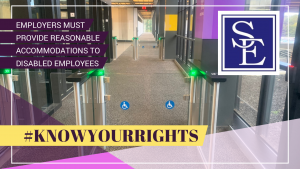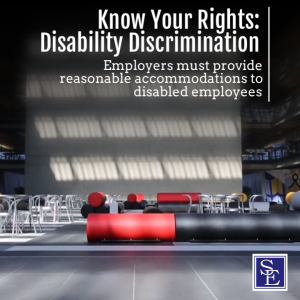New Jersey law provides for strong protections for disabled employees who suffer discrimination at the workplace. What is widely considered as on the most powerful anti-discrimination laws in the country, the New Jersey Law Against Discrimination bars discrimination of individuals based on protected characteristics in the terms and conditions of employment. The law specifically prohibits discrimination based on an employee’s disability or perceived disability and requires employers to engage in an interactive process in order to determine whether a reasonable accommodation can be provided to employees with a disability. What exactly this process and the resulting accommodations may consist of has been established by various court case rulings since the law’s passing in 1945.
Tynan v. Vicinage 13 is a landmark disability discrimination and failure to reasonable accommodated case that was decided in 2002 by a New Jersey Superior Court in the Appellate Division. The plaintiff employee in this case was employed by Vicinage 13 of Superior Court as the Hunterdon County Jury Manager. She suffered from a combination of physical and mental disabilities including migraines, Post-Traumatic Stress Disorder, depression, irritable bowel syndrome, and hypertension. The plaintiff claimed that these disabilities were exacerbated by harassment and mistreatment from her supervisor at Vicinage 13. On multiple occasions, her supervisor issued disciplinary actions against Ms. Tyan for minor oversights and threatened to terminate her employment regularly. The stress caused by the severe treatment and allegedly hostile work environment exacerbated Ms. Tynan’s disabilities and caused her to become sicker, both mentally and physically. Ms. Tynan complained formally to the Assistant Trial Court Administrato and the court’s Human Resources Division, describing her disabilities, the supervisor’s behavior, and a need for accommodations. Tynan was provided with a plan to remedy the situation involving processes of mediation between her and her supervisor.
Shortly after this plan was created, Ms. Tynan’s exacerbated medical conditions caused her to require a leave from her employment with Vicinage 13. She was approved for family leave and planned to return approximately 11 months later. During this leave, Ms. Tynan received treatment for various disabilities, particularly for her depression and hypertension. Her treating physicians recommended that Ms. Tynan continue her leave from Vicinage 13, and that it would be important for her to report to a different administrator upon return as a result of the extreme stress that Pardo’s treatment caused Ms. Tynan. At the end of her planned family leave, Ms. Tynan requested additional time off and to report to a different administrator upon return. The employer denied both of these accommodations and told Ms. Tynan that if she did not report to work immediately, she will be considered to have resigned from her position. Ms. Tynan could not return to work as a result of her disabilities and was effectively terminated from her position with Vicinage 13.
 New Jersey Employment Lawyers Blog
New Jersey Employment Lawyers Blog




